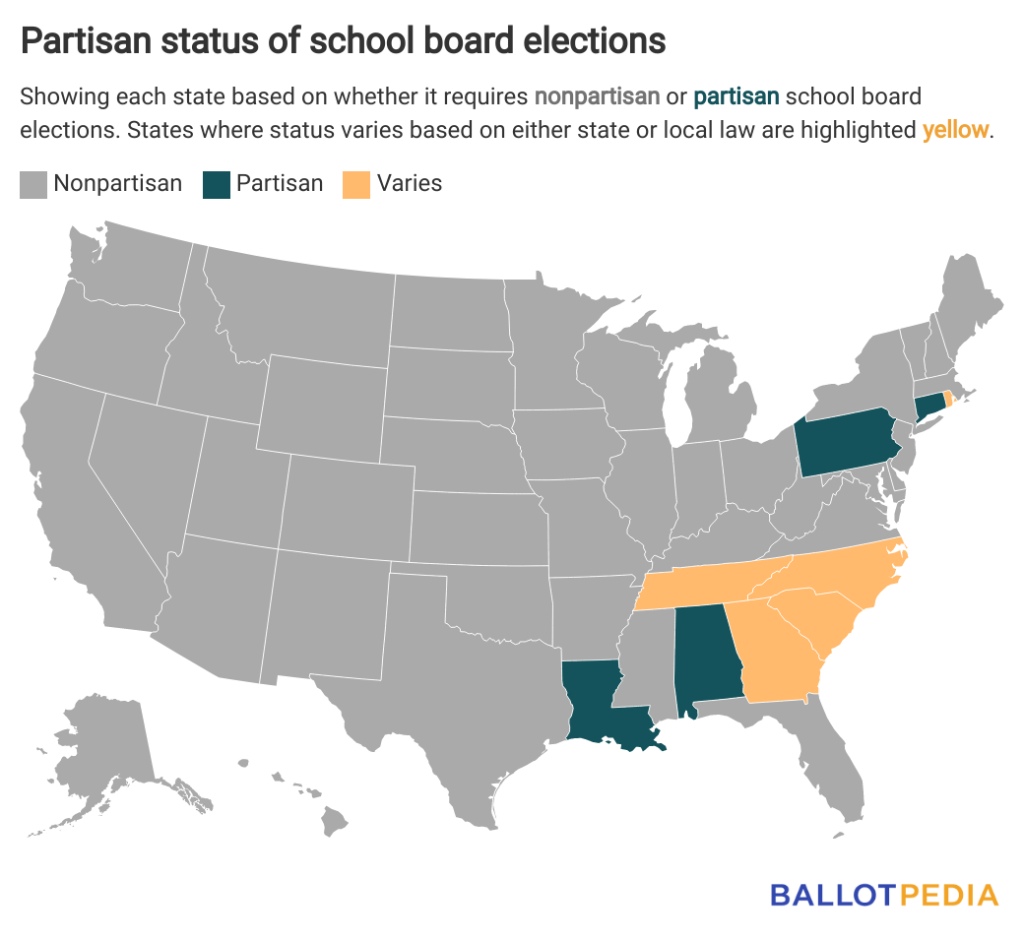Welcome to Hall Pass, where we keep you plugged into the conversations driving school board politics and governance.
In today’s edition, you’ll find:
- On the issues: The debate over whether school reform can improve educational and social outcomes
- In your district: reading programs
- Share candidate endorsements with us!
- School board filing deadlines, election results, and recall certifications
- Florida voters will decide whether to make their school board elections partisan
- Extracurricular: education news from around the web
- Candidate Connection survey
Email us at editor@ballotpedia.org to share reactions or story ideas!
On the issues: The debate over whether school reform can improve educational and social outcomes
In this section, we curate reporting, analysis, and commentary on the issues school board members deliberate when they set out to offer the best education possible in their district.
Today, we look at a recent conversation on how much schools can improve student outcomes. Are students inherently destined for success or failure regardless of educational resources? Can any reforms change academic outcomes?
Freddie DeBoer writes that most proposals for improving schools cannot improve student outcomes. DeBoer says the evidence supports the idea that students have their own natural or intrinsic level of academic potential, which we have no reason to believe we can dramatically change.
Auguste Meyrat writes that some reformers are too optimistic about student potential and the effectiveness of certain reforms. But Meyrat says DeBoer is too pessimistic and suggests that certain changes could still improve the educational system and create opportunities for success for more students.
Education Commentary is Dominated by Optimism Bias | Freddie DeBoer, Substack
“There’s a bias that runs throughout our educational discourse, coming from our media, academia, and the think tanks and foundations that have such sway in education policy. It’s a bias that exists both because of a natural human desire to see every child succeed and because the structural incentives in the field make rejecting that bias professionally risky. The bias I’m talking about is optimism bias, the insistence that all problems in education are solvable and that we can fix them if only we want to badly enough. At least a half-century of research, spending, policy experimentation, and dogged effort has utterly failed to close the gaps that so vex our political class. But still we hear the same old song about how we could close those gaps tomorrow if we really wanted to, an attitude that has distorted education policy and analysis for decades. … This implies that common sense is correct and that individual students have their own natural or intrinsic level of academic potential, which we have no reason to believe we can dramatically change.”
More Money And Gimmicks Won’t Improve Public Schools, But Competition From Charters Will | Auguste Meyrat, The Federalist
“I think most of us would welcome more realism in considering what’s possible in education and what is not, but deBoer’s brand of pessimism is utterly misguided. It mistakes the forest for the trees, casting ineffective educational gimmicks and failed programs as proof that the overall quality of one’s schooling has no effect on an individual’s success. Worse still, by tying academic achievement to inherent ability (nature over nurture), his argument implies the only real way to make a population smarter is through eugenic methods. And no, recommending that the government cut more checks to the poor doesn’t make this argument any less racist or classist. Rather than succumb to despair, we should redouble our efforts in reforming our country’s education system, which obviously stands in great need of it. Although it may not be feasible to cultivate a nation of hyper-intelligent intellectuals or to create a system of perfect academic parity between each and every subgroup in the population, there are many ways to go about improving the system.”
In your district: reading programs
School districts face diverse issues and challenges. We want to hear what's happening in your school district. Please complete the very brief survey below—anonymously, if you prefer—and we may share your response with fellow subscribers in an upcoming newsletter.
Today’s question:
Do you think your district is using the best possible reading program?
Click here to respond!
Share candidate endorsements with us!
As part of our goal to solve the ballot information problem, Ballotpedia is gathering information about school board candidate endorsements. The ballot information gap widens the further down the ballot you go, and is worst for the more than 500,000 local offices nationwide, such as school boards or special districts. Endorsements can help voters know more about their candidates and what they stand for.
Do you know of an individual or group that has endorsed a candidate in your district?
Click here to let us know.
School board update: filing deadlines, election results, and recall certifications
Ballotpedia has historically covered school board elections in about 500 of the country’s largest districts. This year, Ballotpedia is covering elections for approximately 8,750 seats in 3,211 school districts across 28 states—or about 36% of all school board elections this year. Click here to read more about our 2023 school board coverage.
Election results from the past week
Three seats on the Newark Public Schools school board in New Jersey were up for general election on April 25. Allison James-Frison and incumbents Hasani Council and Josephine Garcia won election. James-Frison won 22.1% of the vote, while Council and Garcia won 23.8% and 23.2%, respectively.
Overall, eight candidates were on the ballot.
Council, Garcia, and James-Frison ran as part of the “Move Newark Schools Forward Slate.” Newark Mayor Ras Baraka, who is affiliated with the Democratic Party, endorsed the slate. Baraka endorsed a slate of three candidates called the “Moving Newark Schools Forward” in the 2022 elections. All three candidates won election, receiving about the same percentage of votes as the “Move Newark Schools Forward” slate won this year.
Thomas Luna, Tawana Johnson-Emory, and James Wright Jr. ran as part of the “Newark Kids Forward” slate. Johnson-Emory and Wright Jr. are both teachers at charter schools.
Latoya Jackson, Allison James-Frison, and Ade’Kamil Kelly also ran, though not as part of a slate.
Newark Public Schools is the largest district in New Jersey, with an estimated enrollment of 42,000 students. The board consists of nine members elected to three-year terms, and all members are elected at-large.
Upcoming school board elections
We’re covering school board elections in the following states in the next month.
Nebraska
Lincoln Public Schools, the state’s second largest district by enrollment, is holding general elections on May 2. Primaries were April 4. Three seats are up for election.
Texas
On May 6, we’re covering general elections in 58 Texas school districts, including the following with more than 75,000 students:
- Dallas Independent School District
- Northside Independent School District (Bexar County)
- Fort Worth Independent School District
- Katy Independent School District
- Fort Bend Independent School District
Florida voters will decide whether to make their school board elections partisan
We’re tracking 14 certified and potential education-related measures voters will decide in 2024. One of those is the Florida Partisan School Board Elections Amendment, which would implement partisan elections for seats on the state’s 67 school boards. If you subscribe to the Daily Brew, you may have seen a version of this story on April 24.
We provided some early coverage of that amendment in the April 5 edition of this newsletter, before the legislature had voted to put the amendment on the ballot.
On April 19, the Florida Senate gave final approval to House Joint Resolution 31 (HJR 31), a constitutional amendment that would establish partisan elections for seats on the state’s 67 school boards. The amendment will need at least 60% of the vote to pass in 2024. If it does pass, it’ll take effect for 2026 school board elections.
All 28 Republicans and Sen. Linda Stewart (D) voted in favor of the proposal. The chamber’s remaining 11 Democrats voted against it.
State Rep. Spencer Roach (R), the sponsor of the amendment, said, “This is not about, at least for me, advancing the cause of one political party over another. But for me it’s about transparency, and I simply believe that we have an obligation to give voters as much information about a candidate as possible, and let them make a decision about vetting a candidate.
State Rep. Angela Nixon (D), said, “I believe this bill is not about transparency at all. This bill is about making our school-board elections and our school boards more contentious, more like D.C., which [Republicans] honestly always try to oppose.”
Florida is one of 41 states that hold nonpartisan school board elections where every candidate appears on the same ballot without party labels. Historically, Florida school board candidates ran in partisan races, but voters approved—64.1% to 35.9%—a constitutional amendment in 1998 that made school board elections nonpartisan.
If voters approve the measure, Florida would become the fifth state to hold partisan school board elections exclusively, joining Alabama, Connecticut, Louisiana, and Pennsylvania, where candidates can choose to run under a specific party’s label.
The rules vary in Georgia, North Carolina, Rhode Island, South Carolina, and Tennessee. Some districts use partisan elections, while others use nonpartisan elections with differences typically based on specific state or local laws.

Florida’s proposal was one of a few proposed in legislatures this year. Lawmakers in Indiana and Kentucky introduced similar measures. Unlike in Florida, however, neither advanced from their chamber of origin before their deadlines to be acted upon.
Tennessee most recently changed its school board election methods. In 2021, Gov. Bill Lee (R) signed into law a bill allowing county party committees to decide whether they want to use partisan or nonpartisan elections. Previously, all school board elections were nonpartisan.
Education-related measures are also on the 2024 ballot in Utah and Arkansas.
Extracurricular: education news from around the web
This section contains links to recent education-related articles from around the internet. If you know of a story we should be reading, reply to this email to share it with us!
- Alabama education director ousted over book’s stance on race | Associated Press
- New Florida rule on gender, sex lessons spurs LGBTQ+ critics | Tampa Bay Times
- Bill would make charter school approval easier | Austin American-Statesman
- Stitt unveils compromise Oklahoma education funding plan to ease legislative impasse | KOSU
- After months of controversy, Va. approves new school history standards | The Washington Post
- As GOP ramps up school culture wars, Democrats weigh a counterattack | Chalkbeat
- Schools bought millions of Chromebooks in 2020 — and three years later, they’re starting to break | The Verge
Take our Candidate Connection survey to reach voters in your district

Today, we’re looking at responses from Danny Cage, who is running in the general election for Multnomah Education Service District Board of Directors, Position 6, At-Large, in Oregon, and Jeff Myers, who is running in the general election for Beaverton School District school board Zone 6 in Oregon. Both elections are on May 16.
Multnomah Education Service District is an educational cooperative that provides services to the eight school districts in the county. The Beaverton School District is the third largest school district in Oregon, with an estimated enrollment of around 41,300.
Here’s how Cage answered the question, “What are the main points you want voters to remember about your goals for your time in office?”

- I have served my community as a community organizer, staffer in the legislature, public servant in the office of the governor, consultant to a nonprofit which works to expand access to public budgets for all Oregonians. It has been an honor to serve my community through public service and I will continue this work as a member of the Multnomah Education Service District.
- Students and young people are and must be treated as stakeholders in their own public education. I believe that expanding who has a seat at the table makes for better governance and a more representational society. I am running to be the youngest person to have been elected to the Multnomah Education Service District and as a student to be a stakeholder in our education and bring a new perspective that has historically been left out of public education.
- Vote Danny Cage for Multnomah Education Service District Position 6, At Large
Click here to read the rest of Cage’s answers.
Here’s how Myers answered the question, “What are the main points you want voters to remember about your goals for your time in office?”

- Priority #1: Academics. We need to leverage proven methods and materials for our children to be and feel successful in achieving their goals. It's time to raise the bar!
- Priority #2: Safety. Students and staff need to feel safe and able to focus to be successful. After years of struggling with a failed approach to discipline, we need to go back to basics.
- Priority #3: School Environment. We need to take meaningful action on the top issues impacting school staff: large class sizes, ever-increasing workloads, conflicting priorities, and responsibility without authority.
Click here to read the rest of Myers’ answers.
If you're a school board candidate or incumbent, click here to take the survey.


